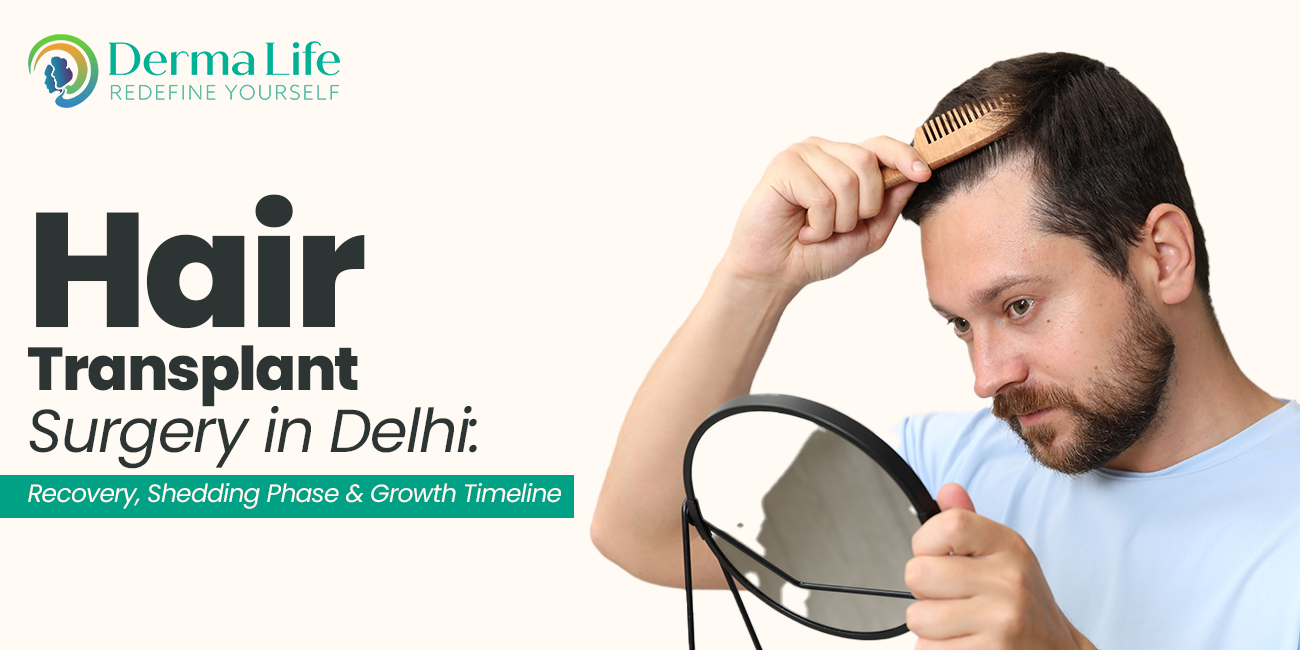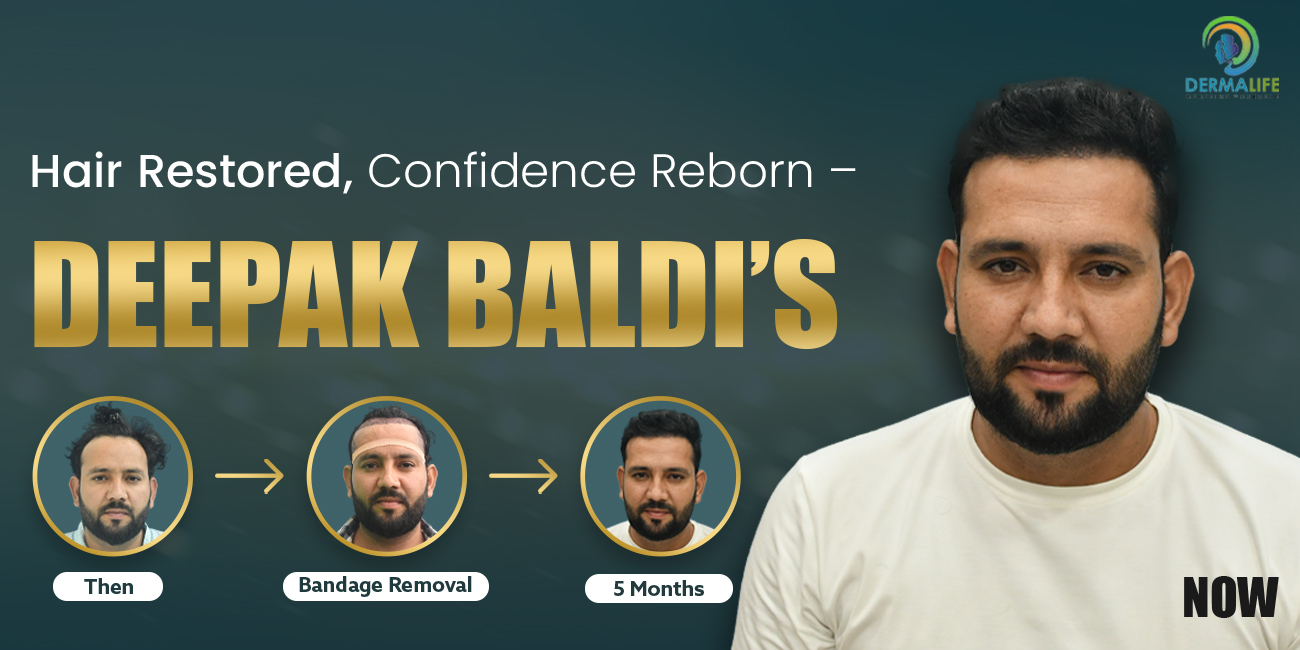Stress can significantly impact hair loss in several ways, contributing to both temporary and chronic forms of hair shedding. It is one of the potential triggers for alopecia areata, an autoimmune disease that is characterized by patchy hair loss on the scalp and other parts of the body.
If you notice patchy, sudden hair loss, it is best to consult your doctor as many hair loss treatments like hair transplants are available.
Stress can cause hair loss irrespective of gender (in both male & female), as it disturbs the hair growth cycle and hinders the regrowth process. According to Dermalife’s experts, stress can also affect hair growth, even after hair restoration treatment.
How does stress cause hair loss?
Not all types of hair loss are due to stress; a person may experience more hair loss when extreme stress is there. As per expert trichologists, different types of hair loss are experienced with high-stress levels. Below we have listed different types of stress-related hair loss, which are:
- Telogen effluvium
It is the most common type of stress-related hair loss, usually around the top of the head. This hair loss lasts fewer than six months, and in about 95 percent of cases, it resolves itself. It affects your entire scalp, and in the early stages, you may experience hair loss.
- Trichotillomania
It is another type of hair loss also known as hair pulling disorder and involves frequent, repeated, and irresistible need of pulling out the hair from your scalp, eyebrows as well as other body areas. For many, the condition can be mild and can be managed but for some the deliberate urge to pull hair out is too much and some treatment options may be needed to reduce the hair pulling.
- Alopecia areata
It is another common hair loss condition that can be triggered by stress and is related to the immune system. The person experiences small coin-shaped patches across the scalp, face, and body. These conditions can be triggered by a stressful event that happened a few weeks before.
How does a hair transplant work?
Hair loss is a very common issue that affects people, and it can be attributed to various factors. Stress is one of those factors that contributes to severe hair loss. If a person’s stress level increases, it triggers many types of hair loss described above. If stress-induced hair loss has become a cause of distress, try out a hair transplant that is the perfect solution for you.
However, stress-induced hair loss is temporary, prolonged, or else chronic as stress impacts the hair follicles leading to long-term or permanent hair loss. But do not worry, as hair transplants can effectively address stress-induced hair loss in both men and women by offering long-term solutions for regrowth in areas affected by hair thinning or baldness.
At first, the experienced Trichologist will evaluate the extent of hair loss, assess the potential donor areas, and also know your goals and expectations. After that suitable donor areas are identified which are generally the back or sides of the scalp. There are mainly two hair transplant techniques used by expert Trichologists:
- FUE – Follicular Unit extraction
The technique involves extraction of the hair follicles directly from the donor area by using a micro punch tool and these follicles are transplanted to the area that has to be treated. It is a great technique that offers minimal care and allows for precise transplantation.
- Boosted FUE Hair Transplant
It is the most advanced method of hair transplant which is done using sophisticated techniques and instruments. This method is mainly used to overcome the limitations of the traditional hair transplant. Boosted FUE hair transplant offers patients a more convenient and satisfying experience compared to traditional procedures. With Boosted FUE, the risk of losing hair grafts during storage is significantly reduced because the process of extracting and implanting grafts is done quickly and directly.
Moreover, Boosted FUE employs a “no root touch” approach, meaning the roots of the grafts are left untouched. This helps improve their survival rate and can lead to denser hair growth post-transplant. In contrast, in traditional methods, there’s a higher risk of damaging the roots, which lowers their chances of survival.
How does stress affect hair transplantation results?
However, stress is rarely seen to affect the results of any hair loss treatment but yes it affects your overall health and hair loss due to increased pressure. Your hair will act the same way as it did before transplantation, and this also means that stress can still trigger hair loss in hair that has been transplanted. It is vital to remember that your transplanted hair will act the same as it did before following the same growth cycle, and your stress-related hair loss will restore the normal growth phase. The DHT-resistant characteristics of the transplanted hair will be the same as when it grew healthy in the donor area. Thus, it is necessary to deal with the stress after a hair transplant as well.
How do you manage stress after a hair transplant?
Hair transplantation is a natural as well as permanent solution to hair thinning and baldness issues in people who are experiencing hair loss. The process of transferring healthy hair follicles to areas where the hair follicles are not active by surgical methods is called hair transplantation. Many factors can affect your overall health which can also have an impact on your hair transplant results and one of those factors is stress. Hair loss due to stress is possible after a hair transplant and thus it is best to manage your stress after hair transplantation as well. For this you can take useful steps to prevent the loss of hair due to stress:
- Maintain a proper balanced diet and engage in regular physical activity
- Ensuring to get enough restorative sleep
- Practicing relaxation methods like deep breathing, yoga, and massage
- Spending time with family and friends
- Avoiding alcohol and tobacco use
- Laughing and having fun
Hair loss and stress are connected and can impact hair regrowth after a hair transplant indirectly. Managing it and maintaining a healthy lifestyle can support successful regrowth. Consult your hair transplant surgeon for post-transplant progress.
Conclusion
Stress is the main cause of many types of hair loss like stress hair loss female and male. However, there are many hair transplant techniques provided by the best hair care clinic in Delhi to help you get your lost hair back. Stress does not necessarily affect the hair loss results and also there is a possibility that your hair might come back if your stress is under control. It is better to take the necessary steps at the right time if you notice rapid or patchy hair loss or else if you notice more than normal hair loss while washing your hair.
It is better to consult an experienced Trichologist in Delhi at Dermalife to know treatment options for losing hair from stress. Book your appointment today for the best hair transplant in Delhi and reliable hair loss treatment.
The expert dermatologists here are known for providing effective baldness treatment and hair loss treatment in Delhi to many clients. At Dermalife, expert dermatologists will assist in determining the actual hair loss cause and provide appropriate, suitable treatment solutions as per the individual’s requirements.
Related Blog – What To Eat After A Hair Transplant?- Food To Eat & Avoid





